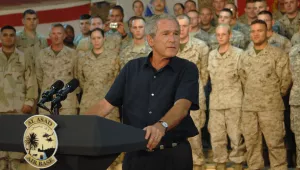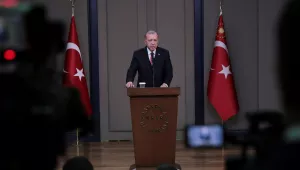PICKING AMONG the various withdrawal plans for Iraq is like choosing a kitten from a litter of runts. Each proposal emphasizes that, at best, theirs is the least-worst option.
Proponents of the "Kurdistan Option" believe that an opportunity still exists to achieve victory in Iraq. Undeterred by setbacks to the "freedom agenda," these cartographic entrepreneurs believe the United States should withdraw all troops to Iraqi Kurdistan and create a long-term presence in order to ensure that at least the northern portion of Iraq realizes the neocon fantasy of a democratic Shangri La in the Middle East. This approach is fraught with peril and should be opposed. Instead, at best, the United States should endorse no more than a transition force in Kurdistan leading to a total withdrawal from the country.
In 1917, in an effort to escape its own Middle East quagmire, the British Empire saw in Palestine a strategic opportunity. Sir Ronald Storrs, the first British governor of Jerusalem, later compared Israel to "a little loyal Jewish Ulster in a sea of potentially hostile Arabism." In eerie similarity, New York Times columnist Thomas L. Friedman recently embraced the "Kurdistan Option," describing Iraqi Kurdistan as a "democratizing example in the heart of the Arab-Muslim world."
Israel's vibrant democracy never had a regional domino effect, and a future democracy in Iraqi Kurdistan will not either. Instead, a US-protected Iraqi Kurdistan is more likely to be perceived as the latest manifestation of US imperial ambitions in the region.
In 1958, Secretary of State John Foster Dulles privately complained that the Arab-Israeli conflict had become "a millstone around our necks." Similarly, any long-term effort to turn Kurdistan into what one Kurdish official described as a "landlocked aircraft carrier" for America could embroil us in an equally bloody morass.
So what, if anything, do we owe the Kurds? Should we protect them from the ensuing wrath of nervous neighbors or their sectarian foes in Iraq? Or do we reenact our shameful exit from the first Gulf War when we left thousands of Kurds at the mercy of the Saddam administration's hara-kiri strategy? Iraq has forced us to contend with these very difficult questions. The trap, of course, is that in our humanitarian impulse to protect our Kurdish allies we will facilitate the dangerous imperial ambitions of the proponents of the "Kurdistan option."
From a strategic standpoint, allowing Iraqi Kurdistan to sink with the rest of Iraq is reckless. Morally, it is unpardonable. A temporary US presence in Iraqi Kurdistan as part of a complete withdrawal from the country could serve four major objectives. First, it would provide a secure base from which to continue the fight against radical Islamist groups in Iraq. Second, if done in consultation and cooperation with Turkey, it could protect against a regionalization of the conflict by working with the Kurdistan Regional Government to go after militants hiding in Kurdistan's mountain sanctuaries. Third, a US force presence could be made contingent on the KRG moderating its irredentist claims and working to come to terms with the central government on oil and revenue-sharing laws. Fourth, such a policy may help temper the security environment in a way conducive to a resolution on the future status of the disputed city of Kirkuk.
Achieving these objectives would be a difficult task. Fighting a counterinsurgency from fixed bases has never been a particularly effective approach. Should a US presence fail to sufficiently allay Turkey's apprehensions about an emboldened, highly autonomous Iraqi Kurdistan, the United States could risk the loss of a strategic ally and be further embroiled in a regional entanglement. The Kurds are the only entity in Iraq that has an interest in solving Kirkuk's disputed status by referendum. The recent ghastly series of suicide attacks on the oil-rich city demonstrate that other parties will turn to more violent approaches, potentially targeting US troops.
Among the runt options for Iraq drawdown, a redeployment of troops as a transition force might be the strategic and wise thing to do; adding Iraqi Kurdistan as the 51st state is not. Right or wrong, a "little Ulster" approach will be perceived as hegemonic behavior shrouded in empty humanitarian rhetoric. Secretary of State Condoleezza Rice is fond of saying that US foreign policy pursued stability at the expense of democracy in the Middle East, and that after 60 years we have achieved neither. Planting our flag in Kurdistan will not reverse this shameful track record.
Matan Chorev is a researcher at the Belfer Center for Science and International Affairs, Kennedy School of Government, Harvard University.
Chorev, Matan. “Opposing the Kurdistan Option for Withdrawal.” The Boston Globe, October 4, 2007





